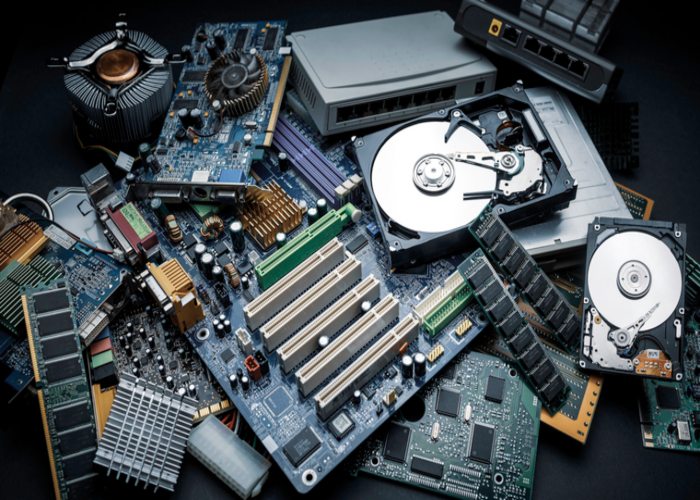Serving the Dallas Fort Worth Area & Nationwide

Hard Drive Recycling, What Gets Re-Used?
In today’s digital age, data storage is a part of everyday life, and hard drives are the backbone of this storage. However, with the rapid advancement in technology, old and obsolete hard drives accumulate quickly. Recycling these hard drives helps manage electronic waste and ensures that valuable materials are reused, reducing the environmental impact. Today, we’ll explore the benefits, processes, environmental impact, and importance of data security in hard drive recycling, and how secure on-site shredding can be an effective solution.
Benefits of Hard Drive Destruction and Recycling
Hard drive destruction and recycling contribute to a more secure and environmentally responsible approach to managing electronic waste. Destroying old hard drives ensures that sensitive information cannot be retrieved, protecting against data breaches and identity theft. This is especially important for businesses and organizations that handle personal and confidential data. Proper destruction of these drives protects against potential misuse of data.
Hard drives contain harmful chemicals and heavy metals, such as lead and mercury, which can leach into the soil and water, causing environmental damage. Recycling prevents these toxic substances from polluting the environment, contributing to a healthier and safer planet.
Resource conservation is also a significant advantage of hard drive recycling. Hard drives contain valuable materials that can be extracted and reused in manufacturing new products. By reusing these materials, we decrease the environmental impact associated with mining and processing raw resources.
Finally, legal compliance is a vital aspect of hard drive destruction and recycling. Businesses must comply with data protection regulations and environmental laws, and proper destruction and recycling of hard drives helps ensure these legal requirements are met. Compliance with these regulations protects businesses from legal repercussions and demonstrates a commitment to ethical and responsible data and waste management practices.
The Process of Hard Drive Recycling
The process of hard drive recycling involves several steps, each designed to ensure that data is destroyed, and valuable materials are efficiently recovered and reused. Before any recycling can occur, the data stored on these hard drives must be securely destroyed to prevent unauthorized access and data breaches. This can be done via shredding, which pulverizes the hard drives into tiny fragments, or degaussing, which uses powerful magnetic fields to erase the data stored on the drives.
Following data destruction, the hard drives are disassembled. This process involves carefully taking apart the drives to separate their various components. Key parts such as circuit boards, metal casings, and plastic housings are identified and sorted.
The next phase is material recovery. Metals like aluminum, copper, and precious metals are extracted for reuse. These metals are highly sought after in the manufacturing industry. Additionally, plastics from the hard drives are recycled or repurposed, reducing the need for virgin plastic production and minimizing environmental impact.
Finally, the recovered materials are sent to manufacturing facilities, where they are used to create new products, effectively completing the recycling loop. This supports the circular economy by keeping resources in use for as long as possible.
Environmental Impact and Sustainability
Recycling hard drives has a positive impact on the environment and promotes sustainability in several ways. One of the primary benefits is the reduction of electronic waste, which is one of the fastest-growing waste streams globally. Hard drives contain various hazardous materials, including heavy metals and toxic chemicals, which can leach into the soil and water, causing severe environmental pollution. By recycling drives, we prevent these harmful substances from entering the ecosystem, thereby protecting natural habitats and reducing pollution. Additionally, the recycling process saves energy compared to producing new materials from raw resources. For instance, extracting metals like aluminum and copper from recycled hard drives consumes considerably less energy than mining and processing these metals from ore. This translates into lower greenhouse gas emissions, contributing to the fight against climate change. Furthermore, recycling supports the sustainable use of resources by recovering valuable materials from obsolete electronics, thus minimizing the need for new raw materials and promoting a circular economy where resources are reused and repurposed.
Importance of Data Security
When hard drives are disposed of without proper data destruction, they pose a significant risk of data breaches and identity theft. Sensitive information stored on these drives, including personal, financial, and business data, can be accessed by unauthorized individuals if not securely destroyed. This is particularly concerning for businesses and organizations that handle large volumes of confidential information. Secure data destruction methods, such as shredding or degaussing, ensure that data is irretrievably destroyed, preventing any possibility of data recovery. This not only protects individuals and businesses from potential financial and reputational damage but also ensures compliance with various data protection regulations and laws. Regulatory frameworks, such as GDPR and HIPAA, mandate strict guidelines for data destruction to protect privacy and confidentiality. Adhering to these regulations through proper data destruction practices helps organizations avoid hefty fines and legal repercussions, reinforcing their commitment to data security and privacy.
Shred & Recycle Your Hard Drives with Secure On-Site Shredding
One of the most effective methods for ensuring the secure destruction and recycling of hard drives is through Secure On-Site Shredding’s services. We provide a convenient and secure solution by coming directly to your location to perform the shredding process. Our services eliminate the risks associated with transporting sensitive data off-site, as you can witness the destruction process firsthand, giving you complete peace of mind. Secure On-Site Shredding makes sure that valuable materials are recovered and reused. Secure On-Site Shredding is AAA NAID Certified which means you and your business are sure to comply with federal and state data protection requirements. NAID is recognized by thousands of private and governmental organizations worldwide. By choosing Secure On-Site Shredding, you can effectively manage electronic waste, protect sensitive information, and contribute to sustainable practices through responsible recycling.
Secure Your Data: Choose Secure On-Site Shredding
If you need reliable and secure destruction of your old hard drives and sensitive documents, Secure On-Site Shredding provides the best service to Dallas-Fort Worth and surrounding areas. Our state-of-the-art mobile shredding units come directly to your location, allowing you to witness the entire destruction process firsthand. Whether you’re a business needing to comply with data protection regulations or an individual seeking to protect your personal information, we have you covered.
Don’t leave your data security to chance. Trust Secure On-Site Shredding for efficient, eco-friendly, and compliant destruction services. Contact us today to schedule your shredding appointment.





